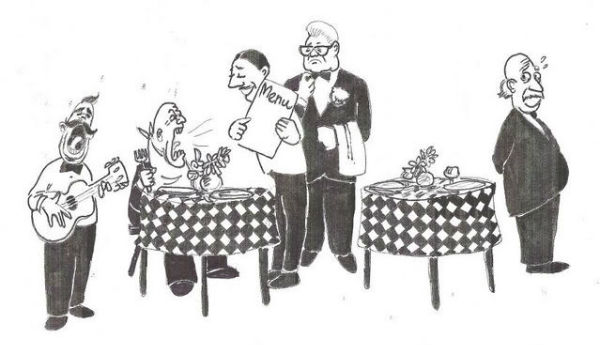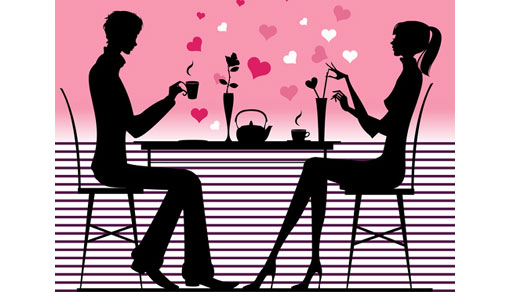People always say the same thing when they complain in a restaurant: “I never complain in restaurants.” Having problems with food or service has a way of putting customers on the defensive. At this point, most of us are programmed to understand that we don’t want to make enemies of the people serving us, so we usually keep our mouths shut. Complaining is a last resort. Our first thought is usually: Is there something wrong with me? You might ask someone else at the table for a second opinion to be sure. Do you think I should send this back? Do you think we should ask to speak to the manager? You will do just about everything you can to avoid being “that guy.”
Dining in a restaurant is an inherently helpless act. You are required to put your faith and trust in a group of strangers to care for one of your basic primal needs—hunger. Unfortunately, when things can go awry, people get “hangry.” Food arrives overcooked or undercooked, your order was misunderstood or service is abrasive or incompetent. Minor infractions left unchecked can devolve quickly into chaos. A colleague of mine was threatened recently by a guest when a dish with an ingredient someone was allergic to was accidentally served to the table.
It should never come to blows, of course. Thankfully, there are things you can do to mitigate the damage so it shouldn’t be necessary to throw a tantrum to get what you want. It’s important to keep in mind that the staff of a restaurant tends to be inherently skeptical of customer complaints. Because they are bombarded with so many dubious ones, management often assumes there are ulterior motives: fishing for buybacks, expecting items to be comped off the bill or just plain power tripping.
We understand that sometimes it’s necessary to express dissatisfaction. Here are a few strategies that will help you make more effective complaints:
You have a voice, use it – Don’t expect the waitstaff to read your mind. Too many situations end up in volcanic eruptions because customers bottle up their feelings until the last minute before saying something. The moment you feel there is a problem, let someone know what’s bothering you. If it’s a delay in service, the staff may have perceived that you’re comfortable with a more leisurely pace. If you have a problem with your food, don’t wait until the plates are cleared to express your dissatisfaction. Saying something immediately will give the staff an opportunity to offer you something else instead. Don’t leave unhappy if you haven’t given the staff an opportunity to remedy the situation.
Introduce yourself – Ask for the person’s name when you have an issue that needs attention. Tell them yours. Being on a first name basis with that person will make the interaction more human. An impersonal approach is unlikely to yield as positive a result. Restaurant people take their jobs very personally and we appreciate when you acknowledge us as individuals not nameless faces.

If you send food back, don’t eat it – If something is wrong with your food, you won’t have very much credibility behind your complaint if you eat most of it. To replace a dish, the server will need to bring the unfinished product back to the chef. The chef will usually inspect the dish, sometimes taste it and almost always say you’re wrong. Regardless, if you eat most of it, the staff will assume that you are just looking for handouts. Be clear if you would like the dish to be replaced or if you would prefer to order something else. Approaching it modesty or even apologetically will minimize any backlash.
Stay cool – Relax, it’s just dinner. The old school mentality that you can’t get what you want if you don’t raise your voice is outmoded. It’s also not an effective strategy. Of course, someone might pacify you to shut you up but it will be at the expense of your relationship with the staff. Demonstrating that your goal is to avoid confrontation will help usher in a peaceful resolution. Nobody likes a bully, and restaurants are no exception. If you behave belligerently, you will be branded with a negative stigma. If they see you again, someone will say “that guy/girl was a dick last time.” It isn’t worth injuring your reputation. Some restaurants may blacklist you completely.
Step away from the table – Making a complaint in front of everyone at the table can humiliate the server and breed animosity. Sometimes a private conversation about an issue away from the table is a better approach. But there is a right way to do it. Never corner your waiter or make him feel threatened. Think of it like asking the judge for a sidebar in court when things are getting contentious. “Do you think our main courses will be arriving soon? We’ve been waiting awhile” or “I didn’t want to make a big thing about it at the table but the [whatever dish] was really salty.” Be casual about it and make it look natural—have the conversation on your way to the bathroom or in passing on your way to having a smoke.
Identify the manager – Almost every dining room has a presiding manager. They should be easily to spot—typically they’ll be dressed a little more formally and not in a standardized uniform. There is a reason they are dressed that way, so it’s easier to identify them as ranking officers. If there is a problem with your table, the manager is your best advocate. If the staff is inattentive or your food is taking too long, the manger wants to know about it. They have more authority to address whatever issue expeditiously. Confrontation should always be a last resort. Asking the waiter to speak with a manager can be construed as an act of war. If you feel a problem germinating, try to summon the manager directly and have a friendly conversation about it. A good manager will remedy the situation and work in tandem with your waiter to get things back on track.
 Wait until tomorrow – Do not—I repeat DO NOT—go straight to Yelp to write up a bad experience. Sometimes it’s healthy to let things ruminate for a day before you make a complaint. In the heat of the moment, your emotions can get the best of you and your message will be lost. Give the restaurant an opportunity to make amends before you broadcast your negative experience to the world. There are so many scenarios where things go wrong that restaurants can learn from and constructive feedback from dissatisfied guests is integral to the process. Waiting a day to have this conversation will ensure that cooler heads will prevail. If management is not responsive to your issues when you call the next day, you have our permission to Yelp away.
Wait until tomorrow – Do not—I repeat DO NOT—go straight to Yelp to write up a bad experience. Sometimes it’s healthy to let things ruminate for a day before you make a complaint. In the heat of the moment, your emotions can get the best of you and your message will be lost. Give the restaurant an opportunity to make amends before you broadcast your negative experience to the world. There are so many scenarios where things go wrong that restaurants can learn from and constructive feedback from dissatisfied guests is integral to the process. Waiting a day to have this conversation will ensure that cooler heads will prevail. If management is not responsive to your issues when you call the next day, you have our permission to Yelp away.



